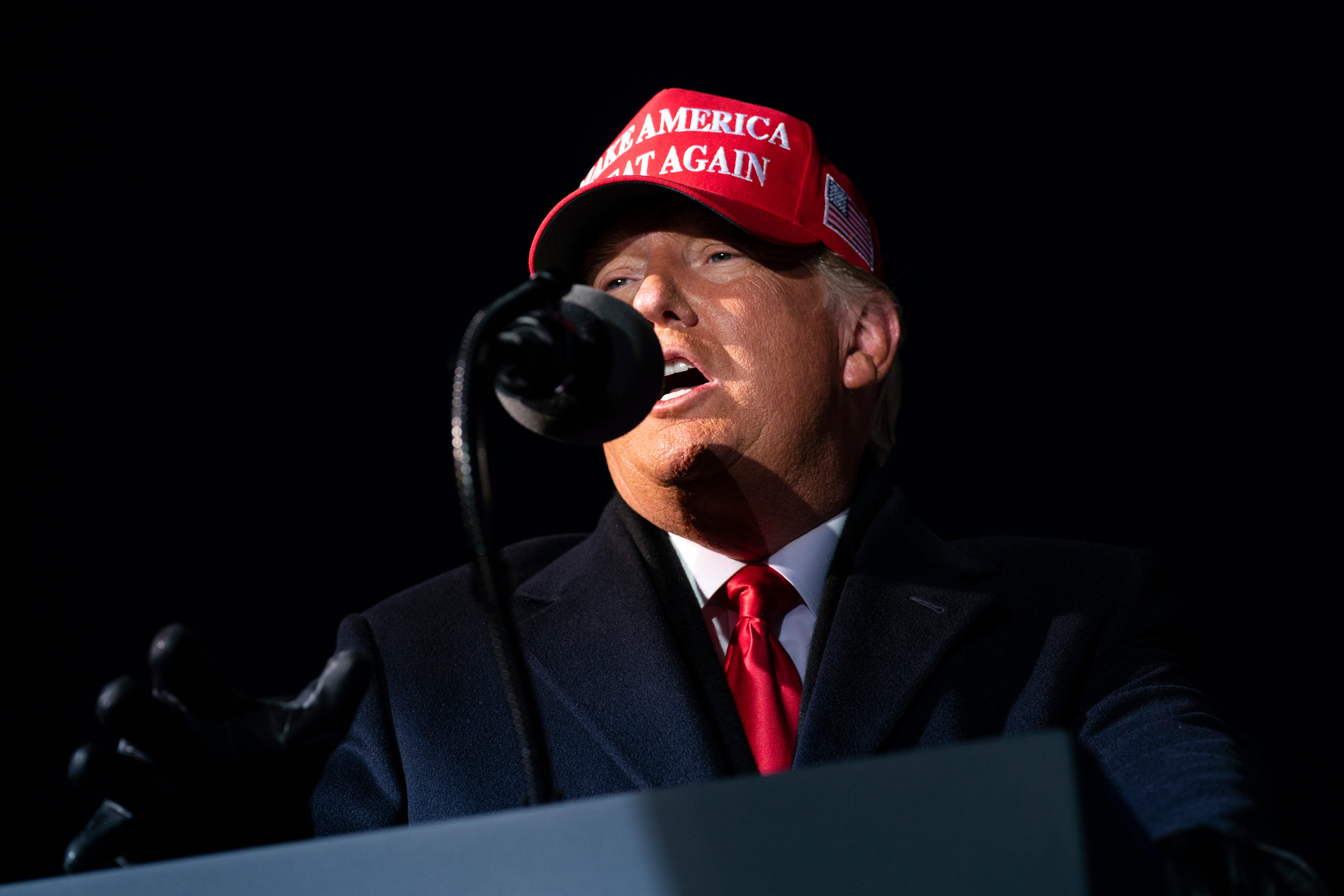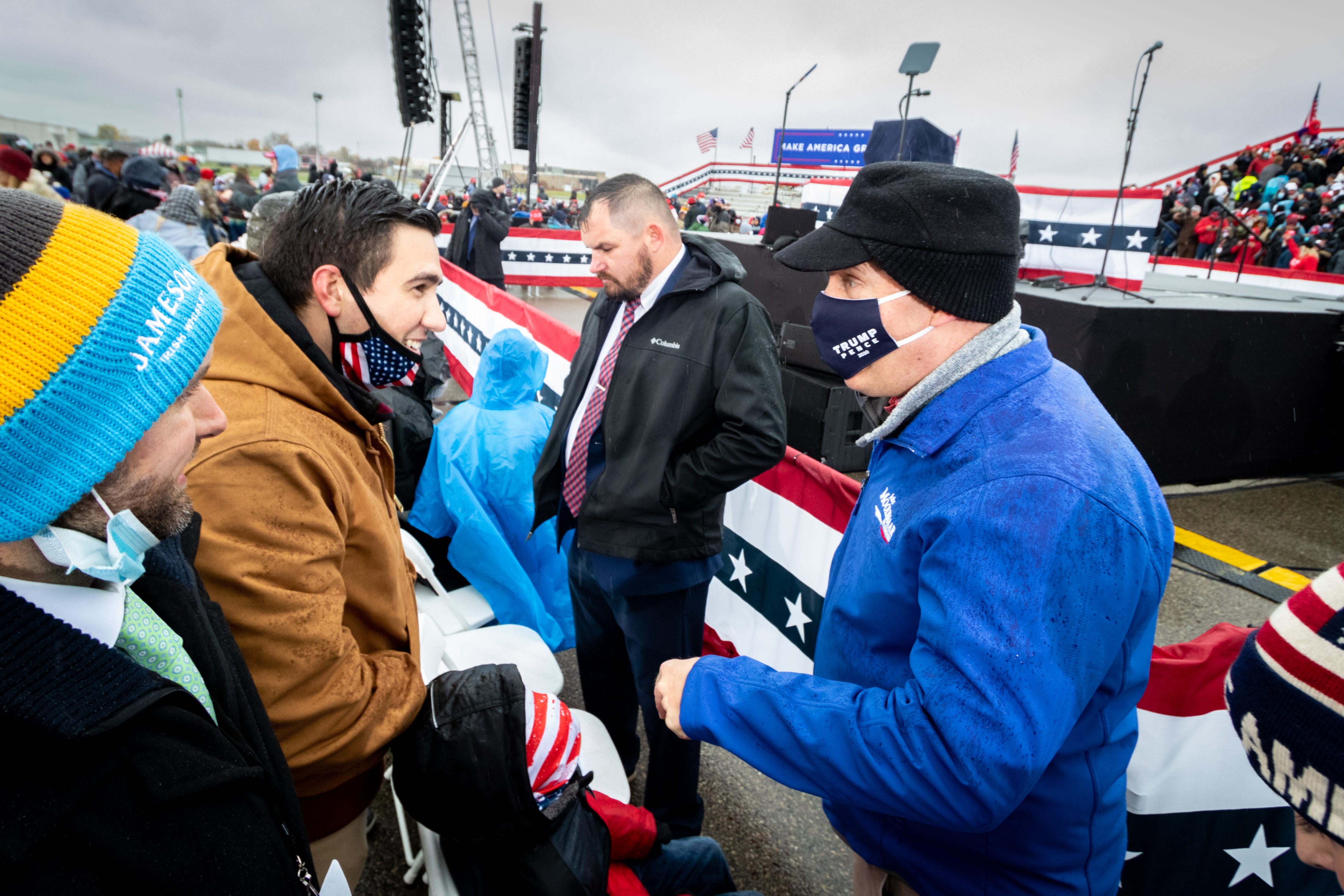4 Michigan GOP lawmakers back Texas suit trying to invalidate state's election
Four Michigan Republican congressmen signed onto a legal brief Thursday in support of the GOP-backed lawsuit filed by Texas seeking to challenge the election results in Michigan and three other battleground states.
U.S. Reps. Tim Walberg of Tipton, Jack Bergman of Watersmeet, Bill Huizenga of Zeeland and John Moolenaar of Midland joined a friend-of-the-court brief to the U.S. Supreme Court with 102 other Republican members of Congress, representing nearly a quarter of the U.S. House.
The lawsuit, which legal experts describe as a long shot, argues election irregularities in Michigan, Pennsylvania, Georgia and Wisconsin need to be investigated and seeks to block their electors from voting in the Electoral College on Monday.
The suit relies on claims that have been rejected by lower courts in Michigan, by election experts and officials, and in testimony during state legislative hearings. Democratic President-elect Joe Biden defeated Republican President Donald Trump in Michigan 51%-48%.
Michigan's other two House Republicans, U.S. Reps. Fred Upton of St. Joseph and Paul Mitchell of Dryden, declined to sign on to the document. Both have acknowledged that Biden won the election.
Mitchell, who is retiring from Congress and has called on Trump to concede, tweeted that he has apparently "failed the Trump won 'loyalty tests' thoroughly."
Separately, a group of Michigan GOP state lawmakers filed Thursday to intervene in the Texas suit, seeking to assert influence over the state's electors.
There is no evidence of widespread fraud in the 2020 election, as officials in Michigan, many other states and even U.S. Attorney General Bill Barr have attested.
Barr told The Associated Press last week that the U.S. Justice Department has uncovered no evidence of widespread voter fraud that could change the outcome of the election.
Biden won Michigan by 154,000 votes — results that were certified last month by bipartisan canvassers in all 83 counties and by the State Board of Canvassers.
'Remaining concerns about integrity'
But Walberg said Thursday it's "increasingly clear that there are still remaining concerns about the integrity of our election system."
"To help address these constitutional issues, the Supreme Court should weigh in," Walberg said in a statement. "My constituents are looking for answers, and this amicus brief calling for the court’s review is one more opportunity to bring greater transparency to the process.”
Huizenga stressed the suit's focus on how the state's election was run and said "the people of Michigan ought to have their day in court."
"I can tell you the volume of calls number of folks in the district who have asked for it," Huizenga said in a Facebook Live video.
"Quite honestly, it's not just Republicans. There's independents and Democrats who also have a lot of questions about the election and about how this was run, how it was tabulated — everything from the equipment to the process."
Bergman said he signed on because he believes Michigan election officials "subverted" state election law and legal precedent.
"I didn’t come to this decision lightly or flippantly, and I didn’t make this decision based on emotion or even frustration with the election outcome," he said in a statement. "I came to this decision because trust in the very foundation of our Republic is at stake."
The lawmakers did not address how a potential order overturning Michigan's election would affect their own re-elections last month.

The Texas challenge
The Texas suit contends the four states that helped deliver the presidential race for Biden had violated election laws and improperly expanded absentee voting during the COVID-19 pandemic. The suit has become the new focus of Trump's efforts to reverse the election's results as presidential electors prepare to meet on Monday.
It asks the justices to issue an order declaring Michigan's election results unconstitutional, blocking the state from choosing electors based on the popular vote and requiring the Legislature to appoint its own electors or appoint no electors at all.
The lawsuit argues in part that Michigan used the COVID-19 pandemic as an excuse to unlawfully mail absentee ballot applications to all of Michigan's registered voters. But two state courts have ruled that Secretary of State Jocelyn Benson acted lawfully in doing so.
Also Thursday, Michigan Attorney General Dana Nessel formally responded to the Texas suit in the Supreme Court, saying the challenge to the state's election is an "unprecedented one, without factual foundation or a valid legal basis" and asking the justices to summarily dismiss it.
For the nation's high court to intervene would be an "intrusion" on the state's sovereignty, according to the response by Nessel and three employees of her office.
"The election in Michigan is over," they wrote. "Texas comes as a stranger to this matter and should not be heard here."
Michigan's brief noted the state's Nov. 3 election had been certified, there had already been court fights over the issues Texas Attorney General Ken Paxton raised and it wasn't proper for another state to weigh in on how elections are run elsewhere.
"It is difficult to conceive of a greater intrusion upon Michigan’s sovereignty than to have another state (haul) it before this Court to answer whether Michigan has followed its own laws in its own elections where its own courts have found no violation," Michigan's response says. "Yet, Texas has done just that."
Nessel previously slammed Paxton's suit as "a publicity stunt" and an attempt to overturn the results of Michigan's elections because he simply didn't like who won.
Speaking on MSNBC late Wednesday, Nessel noted that Republicans in Michigan kept control of the state Legislature in the election, but the suit isn't challenging that outcome — only what happened at the top of the ticket.
"Because if there was fraud at the top of the ticket, how come it didn't extend to the other offices that were being voted on in the same ballot?" Nessel said.
The Plymouth Democrat also issued a warning to any Michigan Republicans who would sign the amicus brief by GOP members of Congress in support of the lawsuit.
"I would caution, of course, anybody in my state to be careful if they want to see the results of our election overturned. Why not, next time, why doesn't California sue us if we happen to vote for a Republican? Why doesn't New York sue us or Massachusetts? I mean where does this end really?" Nessel said.
Secretary of State Jocelyn Benson was also dismissive of the suit, which rehashed many of the claims her office and election experts have explained or debunked in recent weeks in court and committee hearings.
Benson said Thursday it was disappointing but not surprising that others were supporting the Texas action.
"Unfortunately, the misinformation campaign to undermine the credibility of this election has become a national partisan strategy to curry favor with the outgoing president," she said.
"However, none of this makes the lawsuit any less meritless. I fully expect the Supreme Court will uphold the will of the voters in what Attorney General William Barr, the FBI and CISA have said was the most secure election in our nation’s history.”
Richard Friedman, professor of law at University of Michigan Law School, on Wednesday told The News that the Texas suit is not much more than "showmanship" with little chance of success, largely because the issues raised should be addressed in state courts, where they've been "uniformly rejected."
Friedman also doubted that Texas has standing to bring the case.

State reps intervene
At least 12 Republican state lawmakers filed a motion Thursday to intervene in the Texas case in an effort to “establish a constitutional process for the selection of presidential electors” related to the Nov. 3 election.
They contend that state legislators should have a post-election certification vote that would determine the electors for Michigan and want the justices to stop Michigan's electoral vote — scheduled for Monday — until a legislative certification can take place.
Their request appears to conflict with Michigan law, which awards electors to the winner of the popular vote after certification of the election by bipartisan county and state canvassing boards.
The Republican state legislative leaders, House Speaker Lee Chatfield and Senate Majority Leader Mike Shirkey, both have said state law bans the body from awarding the electoral votes to anyone other than the popular vote winner.
Chatfield does not support Thursday's filing, and his position has not changed on the Legislature's role in the electoral process, his spokesman Gideon D'Assandro said.
"Michigan will follow the law and allocate the state's electors to the candidate who won the most votes," D'Assandro said.
The state lawmakers who signed on to Thursday's filing are GOP Reps. Beth Griffin of Mattawan, Douglas Wozniak of Shelby Township, Gary Eisen of St. Clair Township, John Reilly of Lake Orion, Matt Maddock of Milford, Daire Rendon of Lake City, Brad Paquette of Niles, Julie Alexander of Hanover, Rodney Wakeman of Saginaw Township, Greg Markkanen of Hancock, Michele Hoitenga of Manton and Jack O'Malley of Lake Ann.
They were joined by several Pennsylvania lawmakers and Michigan Republican voters Angelic Johnson, Linda Lee Tarver, and Kristina Karamo.
The House GOP released a statement saying Republican Reps. Bronna Kahle of Adrian, Luke Meerman of Coopersville and Joe Bellino of Monroe also were part of the motion, but their names are not listed in the filing.
“State legislatures have plenary power to ensure the accuracy and integrity of the elections under the U.S. and Michigan constitutions, so it is our duty to conduct further investigations,” Alexander said.
“The people expect this, and the people deserve this. Protecting the rights of Michigan citizens and the integrity of our elections is what they sent me to Lansing to do.”
The lawmakers claimed that the “rampant lawlessness” of state election officials and judges threatened the Nov. 3 election.
Their filing again points to several Michigan claims that have already been litigated unsuccessfully in state and federal courts, including poll challengers being barred from meaningful observation at the TCF Center in Detroit and unproven claims of ballots being run multiple times through a tabulator or late night “dumps” of ballots.
The filing also claims nonprofit donations from Facebook founder Mark Zuckerberg to Michigan’s election system gave disparate access to voters in areas of the state. Republican-nominated Court of Claims Judge Christopher Murray denied emergency relief on this count earlier this year.
The filing also points to a problem with Antrim County’s unofficial results Nov. 4, when Trump votes were mistakenly attributed to Biden before the county corrected them.
The issue with Antrim County's presidential results occurred after county Clerk Sheryl Guy failed to update Election Source software on all tabulators after performing an update to two of them. The failure caused the machines to transpose results as they were sent to the county's main software.
The issue, which ultimately would have been caught during canvassing, pushed Dominion Voting Systems into the national spotlight and made it subject to unproven claims of fraud.
mburke@detroitnews.com